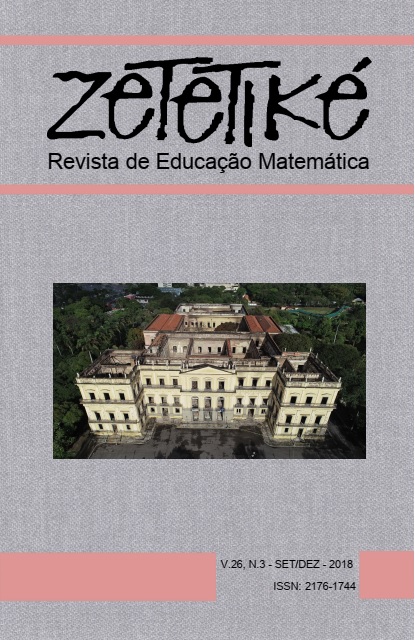Resumo
Este artigo descreve o impacto de um programa de formação de professores do Ensino Básico, que inclui atividades experimentais hands‑on de Astronomia, nas práticas de ensino da Matemática. O programa envolve workshops com conteúdos de Matemática e Ciências, onde são trabalhadas diversas tarefas, para implementar em aula. Com uma metodologia de Teacher Design Research, investiga-se em que medida os professores inovaram as suas práticas, concebendo e implementando tarefas de Matemática, a partir de atividades experimentais hands‑on de Astronomia. A recolha de dados foi feita através de observações de aulas, entrevistas e portefólios realizados pelos professores. Com uma abordagem qualitativa, de natureza interpretativa, conclui‑se que os professores ganharam motivação para conceber e realizar atividades experimentais com os seus alunos, nomeadamente para promover o ensino da Matemática, a partir de atividades experimentais hands‑on de Astronomia.
Referências
Abell, S. K., & McDonald, J. T. (2006). Envisioning a curriculum of inquiry in the elementary school. In Flick, L. B. & Lederman, N. G. (Eds.), Scientific inquiry and nature of science: Implications for teaching, learning, and teacher education (pp. 249-261). Dordrecht, Boston: Springer.
Abrahams, I., Reiss, M. J., & Sharpe, R. (2014). The impact of the getting practical: Improving practical work in science continuing professional development programme on teachers' ideas and practice in science practical work. Research in Science & Technological Education, 32(3), 263-280.
Afonso, M., Neves, I., & Morais, A. M. (2005). Processos de formação e sua relação com o desenvolvimento profissional dos professores. Revista de Educação, 13(1), 5-37.
Ball, D. L. (2003). Mathematics in the 21st century: What mathematical knowledge is needed for teaching mathematics. Paper presented at the Secretary’s Summit on Mathematics, U.S. Department of Education, Washington, DC.
Ball, D. L., Thames, M. H., & Phelps, G. (2008). Content knowledge for teaching what makes it special? Journal of teacher education, 59(5), 389-407.
Bannan-Ritland, B. (2000). Teacher Design Research. An emerging paradigm for teachers' professional development. In A. E. Kelly & R. A. Lesh (Eds.), Handbook of Research Design in Mathematics and Science Education (pp. 246-262). Mahwah, NJ: Lawrence Erlbaum.
Beane, J. A. (1995). Curriculum integration and the disciplines of knowledge. The Phi Delta Kappan, 76(8), 616-622.
Berlin, D. F., & Lee, H. (2005). Integrating science and mathematics education: Historical analysis. School Science and Mathematics, 105(1), 15-24.
Baxter, J. A., Ruzicka, A., Beghetto, R. A., & Livelybrooks, D. (2014). Professional development strategically connecting mathematics and science: The impact on teachers' confidence and practice. School Science and Mathematics, 114(3), 102-113.
Cobb, P., Jackson, K., & Dunlap, C. (2014). Design research: An analysis and critique. Handbook of international research in mathematics education, 481-503.
Cohen, L., Lawrence, M., & Keith, M. (2007). Research Methods in Education. 6th Edition. Taylor and Francis Group.
Costa, M. C.; & Domingos, A. (2017). Innovating teachers’ practices: potentiate the teaching of mathematics through experimental activities. In CERME 10: Dooley, T., & Gueudet, G. (Eds.) (2017). Proceedings of the Tenth Congress of the European Society for Research in Mathematics Education (CERME 10, February 1-5, 2017, pp. 2828-2835). Dublin, Ireland: DCU Institute of Education and ERME.
Fleisch, D.; Kregenow, J. (2013) A Student's Guide to the Mathematics of Astronomy. Cambridge University Press.
Geiger, V., Goos, M., Dole, S., Forgasz, H., & Bennison, A. (2014). Devising principles of design for numeracy tasks. In Curriculum in focus: Research-guided practice: Proceedings of the 37th annual conference of the Mathematics Education Research Group of Australasia (pp. 239-246).
Hewson, P.W. (2007). Teacher Professional Development in Science. In S. K., Abell & N. G., Lederman, Handbook of research on science education (pp. 1177-1203). New York: Routledge.
Kalkan, H., & Kiroglu, K. (2007). Science and nonscience student’s ideas about basic astronomy concepts in preservice training for elementary school teachers. Astronomy Education Review, 6(1), 15-24.
Keeley, P.; Sneider, C. I. (2012). Uncovering student ideas in astronomy: 45 formative assessment probes. NSTA Press.
Lavonen, J., Byman, R., Juuti, K., Meisalo, V., & Uitto, A. (2005). Pupil interest in physics: a survey in Finland. Nordic Studies in Science Education, 1(2), 72-85.
Luft, J., Hill, K., Nixon, R., Campbell, B.; Dubois, S. The knowledge needed to teach science: Approaches, implications, and potential research. In annual meeting of ASTE. Portland, OR, 2015.
Ministério da Educação (ME). (2013) Metas Curriculares de Matemática. Programa de Matemática para o ensino básico - 1.º Ciclo. Lisboa: Departamento da Educação Básica. Retirado em 15 de junho, 2018 de: http://www.dge.mec.pt/matematica.
Ministério da Educação (ME). (s. d.) Programa de Estudo do Meio para o ensino básico - 1.º Ciclo. Lisboa: Departamento da Educação Básica. Ministério da Educação. Retirado em 15 de junho, 2018, de: http://www.dge.mec.pt/ estudo-do-meio.
Morgan, D. L. (1997). The focus group guidebook (Vol. 1). Sage publications.
Murphy, C., Smith, G., Varley, J., & Razı, Ö. (2015). Changing practice: An evaluation of the impact of a nature of science inquiry-based professional development programme on primary teachers. Cogent Education, 2(1), 1077692.
Osborne, J., & Dillon, J. (2008). Science education in Europe: critical reflections. London: The Nuffield Foundation.
Rocard, M., Csermely, P., Jorde, D., Lenzen, D., Walberg-Henriksson, H., & Hemmo, V. (2007). Science education now: A renewed pedagogy for the future of Europe. Bruxelas: Comissão Europeia.
Treacy, P., & O’Donoghue, J. (2014). Authentic Integration: a model for integrating mathematics and science in the classroom. International Journal of Mathematical Education in Science and Technology, 45(5), 703-718.
Trumper, R. (2003). The need for change in elementary school teacher training—a cross-college age study of future teachers’ conceptions of basic astronomy concepts. Teaching and Teacher Education, 19(3), 309-323.
Zawojewski, J., Chamberlin, M., Hjalmarson, M. & Lewis, C. (2008). Developing design studies in mathematics education professional development: Studying teachers’ interpretive systems. Handbook of design research methods in education: Innovations in science, technology, engineering, and mathematics learning and teaching, 216-245.
Zehetmeier, S., Andreitz, I., Erlacher, W., & Rauch, F. (2015). Researching the impact of teacher professional development programmes based on action research, constructivism, and systems theory. Educational action research, 23(2), 162-177.

Este trabalho está licenciado sob uma licença Creative Commons Attribution-NonCommercial-NoDerivatives 4.0 International License.
Copyright (c) 2018 Zetetike


